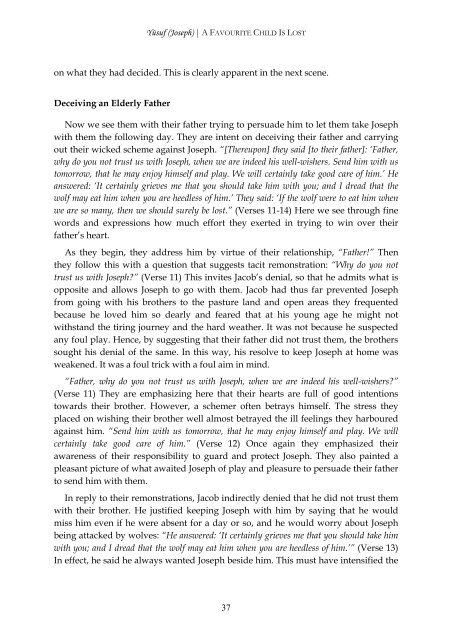Volume 10 Surah 12 - 15 - Enjoy Islam
Volume 10 Surah 12 - 15 - Enjoy Islam
Volume 10 Surah 12 - 15 - Enjoy Islam
Create successful ePaper yourself
Turn your PDF publications into a flip-book with our unique Google optimized e-Paper software.
Yūsuf (Joseph) | A FAVOURITE CHILD IS LOST<br />
on what they had decided. This is clearly apparent in the next scene.<br />
Deceiving an Elderly Father<br />
Now we see them with their father trying to persuade him to let them take Joseph<br />
with them the following day. They are intent on deceiving their father and carrying<br />
out their wicked scheme against Joseph. “[Thereupon] they said [to their father]: ‘Father,<br />
why do you not trust us with Joseph, when we are indeed his well-wishers. Send him with us<br />
tomorrow, that he may enjoy himself and play. We will certainly take good care of him.’ He<br />
answered: ‘It certainly grieves me that you should take him with you; and I dread that the<br />
wolf may eat him when you are heedless of him.’ They said: ‘If the wolf were to eat him when<br />
we are so many, then we should surely be lost.” (Verses 11-14) Here we see through fine<br />
words and expressions how much effort they exerted in trying to win over their<br />
father’s heart.<br />
As they begin, they address him by virtue of their relationship, “Father!” Then<br />
they follow this with a question that suggests tacit remonstration: “Why do you not<br />
trust us with Joseph?” (Verse 11) This invites Jacob’s denial, so that he admits what is<br />
opposite and allows Joseph to go with them. Jacob had thus far prevented Joseph<br />
from going with his brothers to the pasture land and open areas they frequented<br />
because he loved him so dearly and feared that at his young age he might not<br />
withstand the tiring journey and the hard weather. It was not because he suspected<br />
any foul play. Hence, by suggesting that their father did not trust them, the brothers<br />
sought his denial of the same. In this way, his resolve to keep Joseph at home was<br />
weakened. It was a foul trick with a foul aim in mind.<br />
“Father, why do you not trust us with Joseph, when we are indeed his well-wishers?”<br />
(Verse 11) They are emphasizing here that their hearts are full of good intentions<br />
towards their brother. However, a schemer often betrays himself. The stress they<br />
placed on wishing their brother well almost betrayed the ill feelings they harboured<br />
against him. “Send him with us tomorrow, that he may enjoy himself and play. We will<br />
certainly take good care of him.” (Verse <strong>12</strong>) Once again they emphasized their<br />
awareness of their responsibility to guard and protect Joseph. They also painted a<br />
pleasant picture of what awaited Joseph of play and pleasure to persuade their father<br />
to send him with them.<br />
In reply to their remonstrations, Jacob indirectly denied that he did not trust them<br />
with their brother. He justified keeping Joseph with him by saying that he would<br />
miss him even if he were absent for a day or so, and he would worry about Joseph<br />
being attacked by wolves: “He answered: ‘It certainly grieves me that you should take him<br />
with you; and I dread that the wolf may eat him when you are heedless of him.’” (Verse 13)<br />
In effect, he said he always wanted Joseph beside him. This must have intensified the<br />
37

















